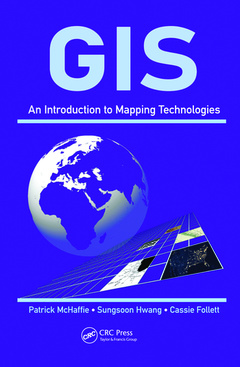GIS An Introduction to Mapping Technologies
Auteurs : McHaffie Patrick, Hwang Sungsoon, Follett Cassie

Over the past few decades the world has been organized through the growth and integration of geographic information systems (GIS) across public and private sector industries, agencies, and organizations. This has happened in a technological context that includes the widespread deployment of multiple digital mobile technologies, digital wireless communication networks, positioning, navigation and mapping services, and cloud-based computing, spawning new ways of imagining, creating, and consuming geospatial information and analytics.
GIS: An Introduction to Mapping Technologies is written with the detached voices of practitioner scholars who draw on a diverse set of experiences and education, with a shared view of GIS that is grounded in the analysis of scale-diverse contexts emphasizing cities and their social and environmental geographies. GIS is presented as a critical toolset that allows analysts to focus on urban social and environmental sustainability.
The book opens with chapters that explore foundational techniques of mapping, data acquisition and field data collection using GNSS, georeferencing, spatial analysis, thematic mapping, and data models. It explores web GIS and open source GIS making geospatial technology available to many who would not be able to access it otherwise. Also, the book covers in depth the integration of remote sensing into GIS, Health GIS, Digital Humanities GIS, and the increased use of GIS in diverse types of organizations. Active learning is emphasized with ArcGIS Desktop lab activities integrated into most of the chapters.
Written by experienced authors from the Department of Geography at DePaul University in Chicago, this textbook is a great introduction to GIS for a diverse range of undergraduates and graduate students, and professionals who are concerned with urbanization, economic justice, and environmental sustainability.
1. Making Sense of Geotechnology 2. Georeferencing 3. Getting the World Into Your GIS 4. Geospatial Analysis: Introduction5. Thematic Mapping 6. Data Models 7. Web GIS 8. Open-Source GIS 9. Introduction to Remote Sensing and GIS 10. Introduction to Health GIS Applications 11. GIS and Digital Humanities 12. Organizational GIS
Patrick McHaffie joined the faculty at DePaul University in 1996 after academic appointments at West Virginia University, Dartmouth College, and West Georgia College. During the 1980’s he served with the Kentucky Geological Survey where he conducted environmental research related to coal mining, directed the National Cartographic Information Center affiliate office, and coordinated the State Topographic Mapping Program. His research interests and publication history include the social history of cartography and GIS, the cartographic labor process, cartographic ethics, the geography of education spending, Appalachian social geography, and the social construction of the global. He currently is completing a study of highway planning in Chicago during the cold war. His work has been supported by grants from the National Science Foundation, History of Cartography Project (University of Wisconsin), and the University Research and Quality of Instruction Councils (DePaul University), and he holds a GISP certification.
Sungsoon Hwang is an Associate Professor in the Department of Geography at DePaul University. She received her B.A. in Geography Education from Seoul National University. She received her M.S. in Geographic Information Systems from University of Nottingham. She received her Ph.D. in Geography with a concentration on Urban and Regional Analysis from State University of New York (SUNY) at Buffalo. She has created and taught 20 courses related to GIS. She has published on fuzzy geodemographics, GIS for sustainability education, and uncertain GPS trajectory computing in the disciplines of geography, urban planning, and computer science.
Cassie Follett is the GIS Coordinator for the Department of Geography at DePaul University, helping to plan and expand GIS capabilities on campus and managing the new GIS Lab on campus. Before coming to DePaul she worked for NASA and the federal Enviro
Date de parution : 06-2020
15.6x23.4 cm
Disponible chez l'éditeur (délai d'approvisionnement : 14 jours).
Prix indicatif 48,88 €
Ajouter au panierDate de parution : 10-2018
15.6x23.4 cm
Disponible chez l'éditeur (délai d'approvisionnement : 13 jours).
Prix indicatif 105,47 €
Ajouter au panierThèmes de GIS :
Mots-clés :
CSV File; FIPS Code; Web GIS; ArcGIS Desktop; ArcGIS Online; GIS Professional; TRI Facility; Open Source GIS; Choropleth Map; Geospatial Data; GIS Software; Web Map; GIS Program; Illinois State Geological Survey; Desktop GIS; Data Model; GIS Desktop Software; GIS User; SPC System; CSV Format; Proportional Symbol Map; Raster Datasets; Single Static Map; Albers Equal Area Conic; UTM Zone



